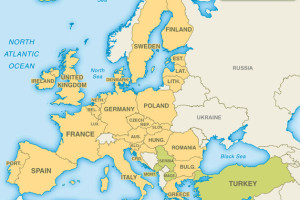RIA Novosti: Opinion: EU-Russia Economic Ties Too Important For Threats to Continue

MOSCOW, May 19 (RIA Novosti), Daria Chernyshova – The EU-Russia economic relationship is far too important for the sides to continue talking in the language of sanctions, so the EU is scaling back its rhetoric, Chris Weafer, a founding partner of Macro Advisory, told RIA Novosti Monday.
“The bottom line is that the economic relationship between Russia and Europe is far too important for both sides. So it doesn’t surprise me that both sides are now looking to de-escalate tensions and make relationships more normal,” Weafer said.
On Monday, EU Ambassador to Russia Vigaudas Ushatskas said that the European Union will work jointly with Russia as part of the Geneva deal to resolve the crisis in Ukraine. Ushatskas said the EU is not currently planning new sanctions against Moscow.
“We are not promising any sanctions, we are interested in working with Russia on agreements which we have jointly reached, such as the Geneva deal and the OSCE roadmap,” the diplomat said.
Commenting on the statement, Weafer pointed out three major reasons for the EU’s change, which had previously supported a US move to impose sanctions against Russia.
“First of all, the European Union has always been much more careful about sanctions threats than the US,” Weafer said, adding that the EU has been more careful not to politicize the dispute and to concentrate on specific Ukraini an issue. “The EU was more careful because of the trade relationship and energy reliance.”
Weafer also noted that “there has been much more of compromising attitude from the Kremlin and from President Putin.”
“Over the last ten days or two weeks there has been a much more compromising attitude coming out of Moscow, and the European media wrote about the US being aggressive and talking about political threats and generally trying to escalate the situation, whereas in Moscow the attitude has been quite different, it was talking about a compromise and ending the dispute, resolving the issues,” Weafer said.
He also stressed that in a gas dispute with Ukraine, the easiest solution for Moscow would be to turn off the taps for Kiev, but Russia didn’t do so.
“The third reason is that Russia has made it very clear that it has options in Asia,” Weafer said. This week President Putin is travelling to China, where a major gas deal is to be signed betwe en the two countries.
“Russia has recently adopted legislation which will make it easier for Chinese and Asian investors to come into Russia. So Russia made it clear to Europe that it is a very profitable place for your companies and your investment, but we have options in Asia and if you don’t want to deal with us, we are going to go to Asia,” Weafer told RIA Novosti.
The EU added two Crimean companies and 13 individuals to a Russian sanctions list last week over the escalating situation in Ukraine. In total, the EU sanctions now target 61 people, including high-ranking Russian officials.
“We do not want to work on sanctions, but if there are no particular steps creating these positive conditions, such a possibility remains,” Ambassador Ushatskas said Monday.
“My guess is that the threats from the US will be more from Congress and Capitol Hill,” Weafer said. “Europe and the Kremlin are going to make peace and their relationship is going ba ck to normal. The White House will also scale back its criticism and threats. So the White House will follow what the European Union does, particularly what Germany does,” he added.
Moscow has repeatedly stated that the language of sanctions is “inappropriate and counterproductive” and warned its Western partners about the “boomerang effect” that sanctions would have.
